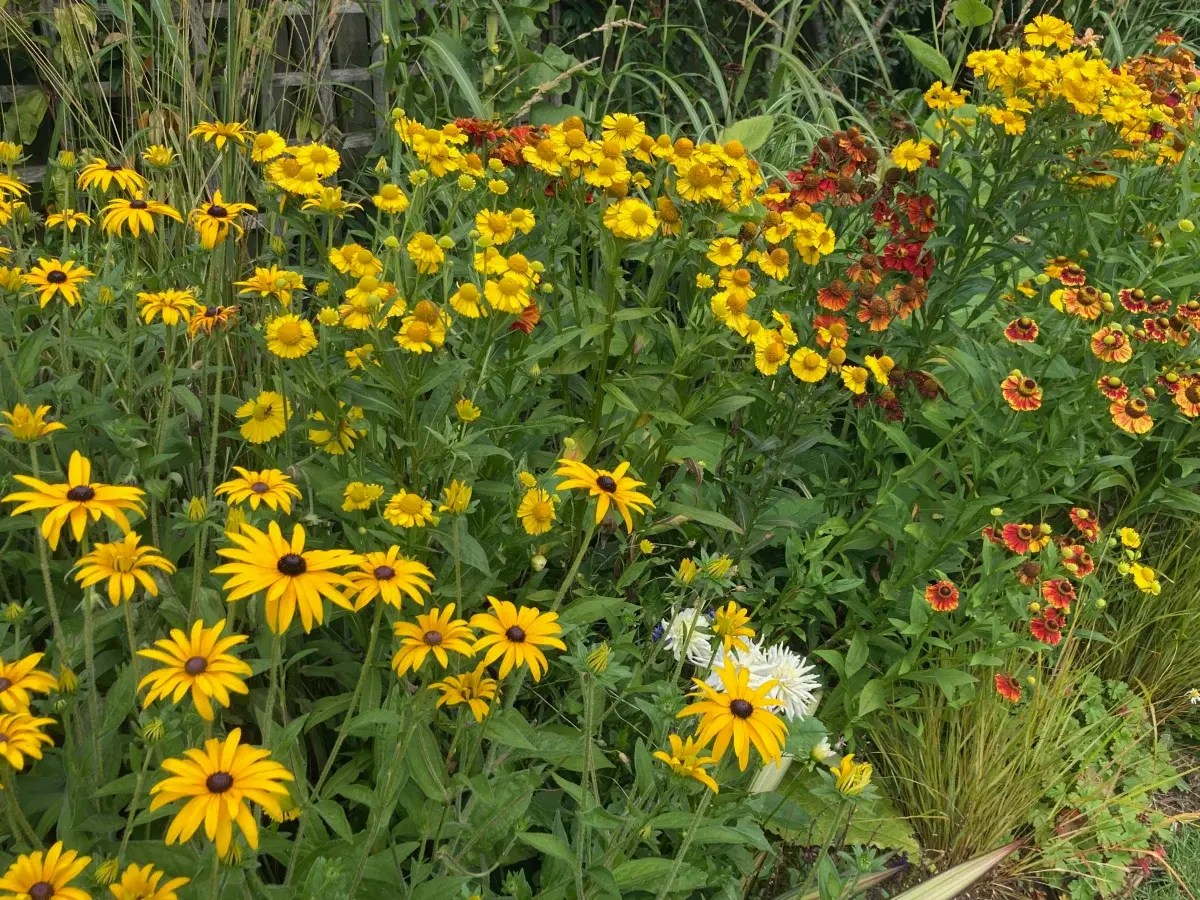Helenium , commonly bed as sneezeweed , is a herbaceous perennial that brings vibrant coloring to belated summertime and autumn garden .
With daisy - same flowers in warm shades of yellow , orange , and red , these comfortable - care plants make a dazzling display attracting butterflies and pollinator .
Helenium can be grown in borders , bungalow garden , or even in containers . They couple beautifully with ornamental grasses , Rudbeckias ( egRudbeckia Goldsturm),Echinaceasand asters , create a coherent former - time of year display , inspired by theperennial planting styles of graphic designer like Piet Oudorf .

Helenium in border with Bronze Fennel, Rudbeckia Goldsturm and ornamental grasses
Helenium ’s upright ontogenesis substance abuse and sturdy stems make it an ideal option for add height and complex body part to garden designs .
Most images here are Helenium Chelsey ( the burnt orange single ) and a mixed variety I grew from root cutting . I have multiplied my store several time by separate the plants , which is gentle to do . There are some pictures of the dividing process below .
All about Helenium
Helenium is named after Helen of Troy , reflecting its beauty and allurement . Despite its uncouth name , sneezeweed does n’t really induce sneeze ; this misconception arise from its historical purpose as sniff .
Key Helenium facts
Helenium care requirements
Best Helenium Cultivars
How to grow Helenium
Soil and Feeding
Helenium thrive in well - drain , fertile soil . They favour slightly acidic to neutral pH ( 6.0 - 7.0 ) . meliorate heavy claysoils by bestow constitutional matter such as compostor well - rotted manure .
Feed plants with a balanced , slow - outlet fertilizer in other spring as new ontogeny emerges . quash over - fertilising , as this can top to weak , floppy stalk .
Watering
While Helenium favor consistently moist grunge , it can tolerate brief full point of drought once established . Water profoundly and regularly during the first grow season to encourage cryptical root growing .
In subsequent age , put up about 2.5 curium of water per week during ironical spells . Avoid overwatering , as this can lead to root rot . Mulching around the plants helps retain moisture and suppressweeds .
Pruning
Pruning Helenium serves multiple design : to preserve works form , promote bushier growth , and prolong the blooming period of time . In recent autumn or early spring , cut back the dead leaf to about 10 cm above ground floor .
During the develop season , deadhead expend flowersregularly to promote continued bloom . For grandiloquent form , you may desire to cut back the root by about one - third in late spring ( the Chelsea chop shot ) to encourage branching and prevent flopping .
Propagation
The easiest method acting to propagate Helenium is through division . Here ’s a footmark - by - stride guide :
or else , you’re able to take basal cuttings in spring or seed germ in fall or other spring .
Common Helenium problems and solutions
Martin Cole has been an greedy plant devotee and gardener for more than 20 days and loves to babble out and write about gardening . In 2006 he was a finalist in the BBC Gardener of the Year competition . He is a member of the National dahlia Society .
He antecedently lived in London and Sydney , Australia , where he claim a sheepskin course in Horticultural study and is now based in North Berwick in Scotland . He founded GardeningStepbyStep.com in 2012 . The website is aim at everybody who know plants or has been bitten by the gardening bug and want to sleep with more .
garden Step by Step has beencited by Thompson and Morgan , the UK ’s expectant mail parliamentary law plant life retailer , as a web site that write expert gardening content .

Helenium in border with Bronze Fennel, Rudbeckia Goldsturm and ornamental grasses





Helenium in border with Bronze Fennel, Rudbeckia Goldsturm and ornamental grasses


Helenium Moorheim Beauty byHerryLawfordis licensed under CC BY 2.0





Offsets available for division

Offset divided from plant

Dug up and awaiting division

Helenium with Rudbeckia
